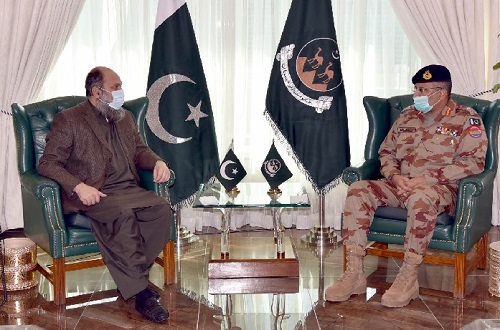By Ateet Sharma and Mrityunjoy Kumar Jha
In a shocking revelation, a serving Pakistan Army Major General has confessed that China has ordered the crushing of Balochistan’s resistance movement within a six-month timeline to open pathways for the controversial China Pakistan Economic Corridor (CPEC) — the flagship of Beijing’s Belt and Road Initiative.
"China has deployed me here to crush the Baloch movement and has given me a six-month task," Major General Aymen Bilal Safdar, the new Inspector General of Frontier Corps (FC), Balochistan South, was quoted as saying by Sangar Publication, a Baloch media group, during a jirga (a traditional assembly of leaders) at the FC headquarters in Turbat a few days ago.
The report said that the special meeting was attended by local agents of FC and intelligence agencies including Raheema Jalal (sister of Federal Minister for Defence Production Zubeida Jalal), Sardar Aziz (head of state-sponsored death squad from Pedarak), Yasir Bahram (head of state-formed death squad, Nagor Dasht) and various heads of armed groups who are working on state parole from Tump, Mand, Buleda, Zamuran, Dasht and Hoshap.
General Bilal told the gathering that he had been posted by Beijing to crush the Baloch national struggle based on his 30 years of service experience, having extensively worked in Quetta, Sibi, Kolwah, Dera Bugti and Awaran.
"China has paid me a salary and a large sum of money and officially posted me here for their regional interests and to thwart Iran's conspiracies against CPEC, as it is a kind of investment in regional interests," he said while blaming Iran for the unrest in Balochistan.
The General lashed out at Iran as a key backer of the Baloch freedom movement.
"If the threat of FATF is averted, we will go inside Iran and take action. Iran is the biggest enemy of Pakistan which has a direct hand in the instability of Balochistan," the General added.
He said that the termination of the Baloch movement, and the success of CPEC is very important for Pakistan and China.
"We have a good amount of money for this task, so let us know how much you need because we can't wait any longer for Iran to create unrest in Balochistan, conspire against CPEC and stab us in the stomach in the name of friendship," the General who is posted in Kech District was quoted as saying by the Baloch publication.
With its prestige riding on CPEC, China has reportedly exhorted Pakistan to “secure” the Gwadar to Kashgar corridor, through heavy troop deployments and what appears to be unbridled coercion.
In fact, the Pakistan Army took total control of the CPEC in a bid to reassure Beijing that their investments will be more secure amid terrorist attacks on Chinese engineers and others facilitating the infrastructure projects. Last week Major General Babar Iftikhar, the Director General of the Pakistan Army’s media wing ISPR assured China that the Pakistan army is now “focused on Balochistan.”
Unlike in the past when the province used to have just one Frontier Corps looking after its security, Gen Iftikhar said that now there were two Frontier Corps stationed in Pakistan’s restive but mineral rich Balochistan, which borders Iran and Afghanistan. The Pakistan Army raised a special security division just to look after CPEC projects. Furthermore, the army moved several formations, earlier stationed at the provincial capital Quetta, to the hinterland for intelligence-based operations.
General Bilal’s remarks that draconian measures on Beijing’s behest are in the offing in Balochistan follow two major events — the killing of youth activist Karima Baloch in Canada and the six Hazara coalminers — that have added fresh momentum to the Baloch resistance movement.
Baloch rebels have warned that Karima Baloch’s killing, and the forced disappearances and killings of thousands of Balochs, will neither be forgiven or forgotten by the people of Balochistan.
"Balochistan has paid a huge price by opposing these projects and we will not hesitate to defend our land in the future. But this war must be fought by the entire civilised world, including the countries of the region. We have made it clear multiple times that the Baloch are willing to unite with any power in line with their national interests against China's imperialist ambitions. We believe that further silence will bring destruction to the entire region, including Balochistan," said Khalil Baloch, Chairman of the Baloch National Movement (BNM).
The surge in Baloch resistance is spiralling repression in Balochistan. General Bilal told Jirga members that the strategically important Gwadar port, China’s gateway to the Arabian Sea was being fenced because of security reasons.
However, the fencing has been halted under the clamour of local protests. Nevertheless, the General asserted that “fencing will happen in any case, we will not allow it to become a political issue".
The Gwadar port is run by the China Overseas Port Holding Company for 40 years under a Long-Term Plan (LTP). It is part of a string of ports in the Indian Ocean that China is building to lower its reliance on the US dominated Malacca Straits, which is its main maritime artery for trade, including energy security. China has also built the deep-water port of Kyaukphyu in Myanmar, in a bid to lower its dependence on the Malacca Straits.




















